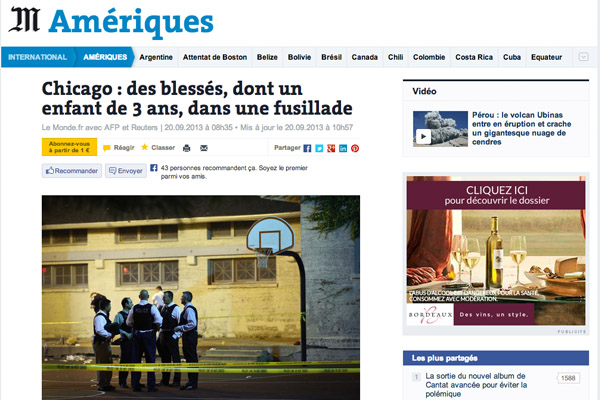
Photo: Courtesy Le Monde
Recent Chicago coverage in the Parisian Le Monde: You probably don't need help translating enfant and fusillade.
People around the world used to think of Al Capone whenever they heard “Chicago.” Today, the city is known for much more—including Barack Obama, the hometown politician who’s sitting in the White House—but its international reputation is still tainted by violence.
What sort of news coverage has Chicago been getting lately in the foreign press? How does the rest of the world see us? I scanned Google news for recent reports from various countries mentioning Chicago—here’s a random sample of stories that turned up.
Not surprisingly, most of the stories late last week were about the recent shootings at a park in the Back of the Yards neighborhood, where 13 people were wounded. The news was reported around the world in just about every language—in Madrid’s El Pais, the Paris newspaper Le Monde, the English-language website Russia Today and Germany’s Stern, to name just a few. Here’s my rough translation of how the report in Stern begins: “In Chicago, brutal scenes have taken place: From a passing car, a stranger shot at a popular basketball court. Several people were injured, including a 3-year-old.”
According to Google’s translation, the report at chinanews.com observes: “Chicago, U.S. President Barack Obama’s hometown, is prone to local gang violence. Earlier this year, Obama has called for an end to gun violence in Chicago and the implementation of gun control measures. However, due to the resistance of the United States Congress, Obama’s plan has been stagnant.”
And then there’s the surreal experience of watching a Chinese-language newscast about the shootings.
I didn’t bother attempting to translate the Cyrillic-alphabet headlines on Russia’s news websites. You can tell from the accompanying photos that most of the Russian news stories about Chicago involved guns and violence.
These are just the latest foreign news stories focusing on crime in Chicago. Not long ago, Ecuador’s El Comercio reported: “Chicago es la ciudad más violenta de Estados Unidos superando a Nueva York.” (“Chicago is the most violent city in the United States, beating New York.”) And a headline in London’s Telegraph declared: “Chicago: the murder capital of America.”
The Cuban news website CubaSi.com picked up a BBC report on Chicago’s Safe Passage routes for students attending different schools this fall. The headline was “Policía supervisa primer día de clases en Chicago,” or “Police oversee the first day of classes in Chicago.” The photo that ran with the story seemed designed to heighten the sense of alarm, showing authorities responding to an emergency. But where was that picture from? A Google image search turns up its origins: It’s actually from the Aug. 20 incident in Decatur, Ga., when a gunman entered a school but surrendered before shooting anyone.
The foreign media’s coverage of Chicago isn’t all negative, however. The local officials promoting tourism must be pleased to see press releases about Chicago events turning up in overseas websites. For example, the Weser-Kurier newspaper in Bremen, Germany, promoted the Chicago Architecture Foundation’s Oct. 19-20 Open House Chicago event.
China’s official Xinhua News Agency reported that Chicago was ranked as the second most popular city in the U.S. for holding conferences. And China.com touted the Magnificent Mile’s Shopping Festival.
In Bad Hersfeld, Germany, the local newspaper announced that the city is starting a book-discussion program. The article quotes one of the organizers: “The movement began in Chicago and was known there as ‘One Book, One City,’” he says. “It no longer takes place there, however, because the responsible committees could not agree on a book.” Wait, what? To the readers in Bad Hersfeld: One Book, One Chicago is actually alive and well.
Chinese-language media have been reporting on “Transformers 4,” including this report at Shangdu.com about the Chinese “Mandopop” idol Han Geng going to Chicago for the filming.
According to the news website ent.ifeng.com, reporters looking at photos from the Chicago set of “Transformers 4” noticed an image advertising a well-known brand of Wuhan duck neck, a spicy snack that’s popular in China. “This is the first example of Wuhan local brands implanted in Hollywood blockbusters,” the article reports, according to a Google translation. (If Google can be trusted, the story also includes this subhead: “Please Transformers, eat duck neck.”)
That’s not the only peculiar food-related Chicago news showing up in the China’s media. Another Chinese-language site, iask.ca, recently reported that Chicago’s Frontier restaurant serves whole smoked alligators (a phenomenon covered last year by Chicagoist). Google’s rough translation of the headline: “Chicago restaurant pushes alternative meal to terrified customers.”
But back to the violence. The Belgian news website L’avenir.net ran an article about the town of Rumes, quoting a local official who called it “une oasis de quietude” that’s relatively free from crime. (I’m relying here on Google’s translation and my own rusty memory of college French classes.) And so what was the headline on top of this report?
“Rumes n’est pas un autre Chicago!” Translation: Rumes isn’t another Chicago!
Thanks for that, Belgium.


